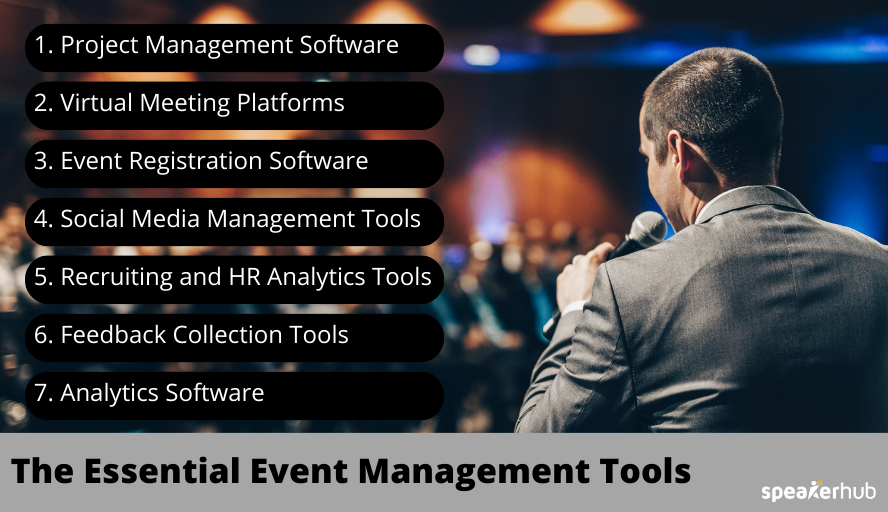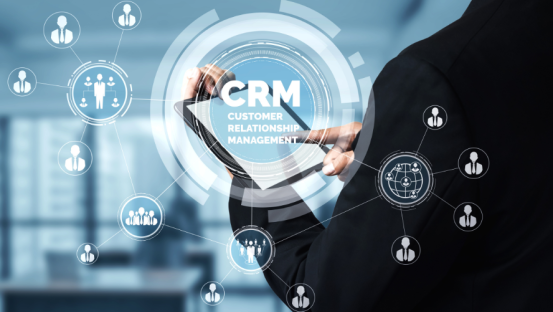Event Management Essentials: 7 Must-Have Tools for Every Event Manager

In the grand theater of event management, orchestrating a successful event is like conducting a symphony. Every participant plays a unique note, and it's the event manager's role as the conductor to ensure these notes form a beautiful melody. It is not just the role of the conductor but their baton—representing the essential tools—that guide the symphony from the opening overture to the final encore.
The Importance of Tools in Event Management

In event management, the right tools are as crucial as a conductor's baton to the symphony. They are the invisible threads that bind the various components of an event, seamlessly orchestrating a coherent narrative from what would otherwise be disparate elements.
Like a baton slicing through the air, these tools create a rhythm and direction that enables the entire ensemble—the speakers, attendees, sponsors, and staff—to play their parts in perfect harmony. They allow the manager to delegate tasks, manage resources, communicate effectively, and respond swiftly to the unexpected.
The conductor's baton does not make a sound. However, it guides the musicians to create a symphony that resonates with every audience member. Similarly, an event manager's tools may work behind the scenes, but the influence is felt in every smoothly run event, satisfied attendee, and achieved goal.
The Essential Event Management Tools
Going into the world of event management is like stepping into an orchestra pit. Each event is a symphony, and the success of the performance relies heavily on how well each part is conducted. As an event manager or the conductor in our symphony, there are seven key tools or “instruments” that, when played well, will ensure the melody of success. Let's take a closer look at these essential tools that make music happen.

1. Project Management Software
Like a seasoned maestro, an event manager utilizes tools such as Asana or Trello to harmonize each member's efforts, synchronizing the orchestra of activities. These platforms allow task assignment and progress tracking, and ensure that everyone plays the same sheet of music, irrespective of the complexity of the composition. It's like the grand conductor's baton that commands the ensemble and makes sure that every section comes in at the right time to create a harmonious melody.
Example: Global conference planners often turn to these tools to synchronize the efforts of their international teams, maintaining a clear, cohesive strategy. For instance, take the team organizing the Mobile World Congress, an event with several stakeholders dispersed globally. Using project management tools, they ensure that everyone is on the same page no matter the time zone or distance, preventing any cacophonous clashes.
2. Virtual Meeting Platforms
In the increasingly digital landscape of our time, virtual meeting platforms such as Zoom have grown in importance. To a manager, they're akin to the grand stages where our orchestra performs. These platforms facilitate both face-to-face and virtual interactions, expanding the reach of our performance to audiences around the world. The show must go on, and these platforms ensure that distance is no longer a barrier to participation.
Example: Look no further than the World Economic Forum. The prestigious event, typically held in Davos, had to transition to a twin format, with both in-person and virtual options in light of the pandemic. Expertly utilizing platforms like Zoom, the organizers brought together global leaders to discuss and strategize on pressing world issues. They kept the music playing even in the face of adversity.
3. Event Registration Software
In the symphony of event management, Eventbrite and similar platforms act like efficient ticket vendors, managing audience inflow and seating. They streamline the registration process, effectively controlling the number of attendees and ensuring that each participant finds their place in the auditorium.
Example: Consider the scenario of Comic-Con International. This annual multi-genre entertainment and comic convention attracts hundreds of thousands of fans. By leveraging event registration software, the managers effectively handle the massive influx of attendees and deliver a seamless experience from registration to entry.
4. Social Media Management Tools
Just as the whisper of a well-played violin can reach every corner of a concert hall, tools like Hootsuite amplify your event’s presence across various social media platforms. They serve as a stage for your event to shine in the digital sphere, broadcasting its melodies to a global audience and inviting engagement from prospective attendees.
Example: The Coachella Music Festival is an excellent example of an event that utilizes social media management tools to full effect. Through these platforms, they broadcast lineup announcements and event highlights. This creates a buzz that reverberates throughout the digital landscape and drums up anticipation for upcoming performances. These tools have played a key role in transforming Coachella into the globally renowned festival it is today.
5. Recruiting and HR Analytics Tools
In event management, sourcing the right talent is akin to composing the perfect melody. For instance, a platform such as SignalHire acts as your talent scout, helping you find and connect with the ideal candidates to perform various roles at your event. Just as a talent scout keeps an ear out for potential virtuosos in a crowd of performers, such an app scours the vast digital landscape to find the best fit for your event. One particular feature of note is SignalHire's Chrome/Firefox extension, which provides instant access to comprehensive candidate profiles on any social media platform. This enhances your scouting capabilities.
Example: Let's consider the organizers of TEDx conferences. They often need to find unique speakers who can deliver powerful, inspirational talks. With SignalHire, they can scout and reach out directly to potential speakers, turning the arduous talent acquisition process into a more straightforward and efficient endeavor.
6. Feedback Collection Tools
Tools like SurveyMonkey serve as attentive listeners in the concert hall, quietly registering the audience's reactions to the performance. They gather invaluable feedback from the attendees, helping the event manager understand which parts of the performance hit the right notes and which might have fallen flat. This feedback is crucial in refining future events and pushing for continual improvement.
Example: Consider the event managers of the Boston Marathon. To make each year's event better than the last, they have utilized feedback collection tools to build an in-depth understanding of the runners’ experience. This invaluable feedback has allowed them to improve the event significantly, enhancing the overall runner and spectator experience.
7. Analytics Software
Analytics software such as Google Analytics acts as the discerning music critic of event management, meticulously analyzing every note of the concert. They provide comprehensive insights into an event's performance, tracking user engagement and delivering real-time data. This data allows the manager to understand what worked well and which areas might need a change of tune.
Example: Consider the Adobe Summit. The organizers have used analytics software to measure success. They scrutinize every detail, from the number of participants to the level of engagement in each session. This data-driven approach helps companies like Adobe refine and enhance the event so that every Adobe Summit is better than the previous one.
Conclusion
As our symphony draws to a close, we recapitulate the key theme: in event management, tools such as project management software, virtual meeting platforms, event registration software, social media management tools, SignalHire, feedback collection tools, and analytics software are as critical as the baton in the hands of the conductor.
Remember that just as the baton does not conduct the orchestra but aids the conductor in bringing out the best in the musicians, the tool itself doesn't make the event. Like a skilled conductor, it’s the manager who wields these tools to direct a memorable experience. Each tool is a note in the symphony, and it’s the event manager who makes the music.





